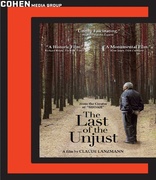The Last of the Unjust Blu-ray Movie
HomeThe Last of the Unjust Blu-ray Movie 
Le dernier des injustesCohen Media Group | 2013 | 220 min | Rated PG-13 | Sep 23, 2014
Movie rating
7 | / 10 |
Blu-ray rating
| Users | 0.0 | |
| Reviewer | 4.5 | |
| Overall | 4.5 |
Overview
The Last of the Unjust (2013)
A place: Theresienstadt. A unique place of propaganda which Adolf Eichmann called the "model ghetto", designed to mislead the world and Jewish people regarding its real nature, to be the last step before the gas chamber. A man: Benjamin Murmelstein, last president of the Theresienstadt Jewish Council, a fallen hero condemned to exile, who was forced to negotiate day after day from 1938 until the end of the war with Eichmann, to whose trial Murmelstein wasn't even called to testify. Even though he was without a doubt the one who knew the Nazi executioner best. More than twenty-five years after Shoah, Claude Lanzmann's new film reveals a little-known yet fundamental aspect of the Holocaust, and sheds light on the origins of the "Final Solution" like never before.
Starring: Benjamin Murmelstein, Claude LanzmannDirector: Claude Lanzmann
| Documentary | 100% |
Specifications
Video
Video codec: MPEG-4 AVC
Video resolution: 1080p
Aspect ratio: 1.85:1
Original aspect ratio: 1.37:1, 1.85:1
Audio
German: DTS-HD Master Audio 5.1
German: Dolby Digital 5.1
Subtitles
English
Discs
50GB Blu-ray Disc
Two-disc set (2 BDs)
Playback
Region A (B, C untested)
Review
Rating summary
| Movie | 4.5 | |
| Video | 4.5 | |
| Audio | 4.0 | |
| Extras | 1.0 | |
| Overall | 4.5 |
The Last of the Unjust Blu-ray Movie Review
Reviewed by Jeffrey Kauffman September 24, 2014Claude Lanzmann begins this follow-up to his epic Holocaust documentary Shoah with the following long but informative crawl, giving audience members a detailed but compelling account of the history and context surrounding The Last of the Unjust:
Rabbi Benjamin Murmelstein was the last Chairman of the Theresienstadt Judenrat (Jewish Council). I filmed him during a whole week in Rome in 1975.
In my eyes, the case of Theresienstadt was capital, both lateral and central, in the genesis and process of the Final Solution.
These hours of interviews, rich in firsthand revelations, have continued to dwell in my mind and haunt me.
I knew that I was the custodian of something unique but backed away from the difficulties of constructing such a film.
It took me a long time to accept the fact that I had no right to keep it to myself.
Theresienstadt, 60 km northwest of Prague, a fortress town built in the late eighteenth century, had been picked by the Nazis as the site of what Adolf Eichmann himself called a “model ghetto” — a show ghetto.
As they had done in every ghetto in Poland since October 1939, the Nazis formed a Jewish Council, composed of twelve members and an Elder, called the Judenalteste — literally “the oldest of the Jews” — in their vocabulary of contempt and fear with its tribal connotations.
In Theresienstadt, between November 1941 and spring 1945, during the four years of the ghetto’s existence, there were three successive Elders of the Jews.
The first, Jacob Edelstein, was a Zionist from Prague who cherished youth. After two years of Nazi hell in which everything, absolutely everything, was forbidden to the Jews, he welcomed the birth of Theresienstadt with blind optimism, hoping that the difficult life that awaited them there would prepare them for their future settlement in Palestine.
The Nazis arrested him in November 1943, deported him to Auschwitz and killed him six months later with a bullet in the back of his head (Genickschuss) after murdering his wife and son before his eyes in the same manner.
The second Elder was Paul Eppstein; he was from Berlin and was also killed by a bullet in the back of his head in Theresienstadt itself on September 27, 1944.
Benjamin Murmelstein, the third and therefore final Elder, a rabbi from Vienna, was named Elder in December 1944. Murmelstein had a striking appearance and was brilliantly intelligent, the cleverest of the three and perhaps the most courageous.
Unlike Jacob Edelstein, he could not bear the suffering of the elderly. Although he succeeded in keeping the ghetto going until the final days of the war and saved the population from the death marches ordered by Hitler, the hatred of some of the survivors came to be focused upon him.
He could easily have fled. He refused, preferring to be arrested and imprisoned by the Czech authorities after a number of Jews accused him of collaborating with the enemy. He spent eighteen months in prison before being acquitted of all charges.
He went into exile in Rome, where he lived a harsh life. He never went to Israel despite his deep desire to do so and his pure love for that land.
All the Elders of the Jews met a tragic end. Benjamin Murmelstein is the only Jewish Council Elder who survived the war, making his testimony infinitely precious. He does not lie; he is ironic, sardonic, harsh with others and with himself.
Thinking of the title of André Schwarz-Bart’s masterpiece, The Last of the Just, he calls himself “The last of the unjust.” He thus gave this film its title. Before our interviews in 1975, he had written a book in Italian entitled, “Terzin, il ghetto modello di Eichmann”, published in 1961.
When I first quote him in the film, the year is 1942, with the arrival of a “transport” of German Jews from Hamburg. But, since 1941, Theresienstadt had above all been populated by Czech and Austrian Jews.
Thanks to the former, members of the technical office responsible for developing construction plans, outstanding designers, we have an extraordinary collection of works of art that reveal what real life was like in the “model ghetto”: built to house 7,000 soldiers at the most, Theresienstadt took in 50,000 Jews during its peak periods.
Most of these artists of genius, who got up in the middle of the night to secretly complete works that they interred deep underground, were murdered in the gas chambers of the death camps.
— Claude Lanzmann
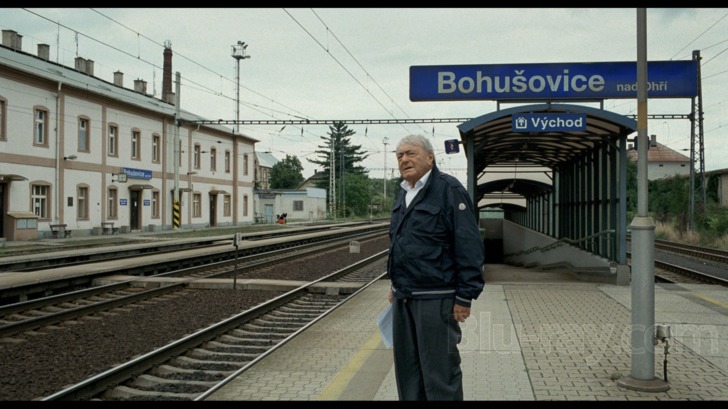
Many of us who lost relatives in the Holocaust went to Shoah as almost a rite of passage, sitting through what was (in many theatrical exhibitions) a two day ordeal of witnessing which even in its slightly redacted form in the United States ran well over nine hours (other markets saw releases in excess of ten hours). Lanzmann brings that same languor to The Last of the Unjust, spending close to four hours unspooling his 1975 footage with Murmelstein while intercutting contemporary footage which finds a now considerably older Lanzmann tooling about the ruins of Theresienstadt and reading from Murmelstein’s writings. There are also snippets from the Nazi propaganda film made about Theresienstadt (the entire film evidently no longer exists), as well as haunting images of art work left behind by actual Theresienstadt residents, as alluded to in Lanzmann's long opening statement reprinted above.
They say that history is written by the victor, but it becomes clear over the course of the sprawling interviews Lanzmann conducted with Murmelstein that Murmelstein does not really consider himself a “victor”, at least not in the traditional sense of the word, and in fact is initially hesitant to even begin recounting some of the horrors he witnessed. There’s also a subtle hint that even Murmelstein is not above prevaricating now and again, perhaps twisting the historical record to agree with his bitterness and regret, and therefore Lanzmann often serves as not just an interviewer but also a moderator of sorts.
It’s impossible not to hear Murmelstein, who is indeed quite brilliant, as well as incredibly articulate (not to mention verbose, at least once he gets going), understand the predicament he found himself in as the Elder of Thereseienstadt, and not think of things like Vichy and how the public at large came to view these “intermediaries”. Now there are some manifest differences, all to Murmelstein’s credit, including work he did when the Red Cross got involved shortly before the war’s end, as well as his heroic efforts to save as many Jews as possible in the calamitous final days of the conflict. But there’s little doubt that in his own way, Murmelstein was looked upon by Jews as some Frenchmen disparagingly viewed Vichy—these were “collaborators”, no matter what the context. It’s notable that Murmelstein himself was obviously aware of this, one reason he chose to stay and take his lumps as it were when he had not only the right but the diplomatic ability to simply walk away.
The Nazis were obviously masters of propaganda, courtesy of such people as Joseph Goebbels and (unwittingly or wittingly) Leni Riefenstahl. The importance of all of Lanzmann’s epochal documentaries, including and perhaps especially The Last of the Unjust, is putting the lie firmly and finally to the image of Nazis as benevolent protectors of Jews, a ridiculous image the Nazis sought to create, then burnish, with their “model ghetto” (that such an oxymoron wouldn’t inherently invite disdain is perhaps a sad sign of the times, both then and now). Murmelstein comes off as a complex, resilient, perhaps partially defeated older man who has resigned himself to the horrible vagaries of fate that played out in his life. Lanzmann may not have initially known what to do with such an epic interview, but he’s fashioned another unforgettable documentary with The Last of the Unjust. Survival is a mixed blessing, to be sure.
The Last of the Unjust Blu-ray Movie, Video Quality 
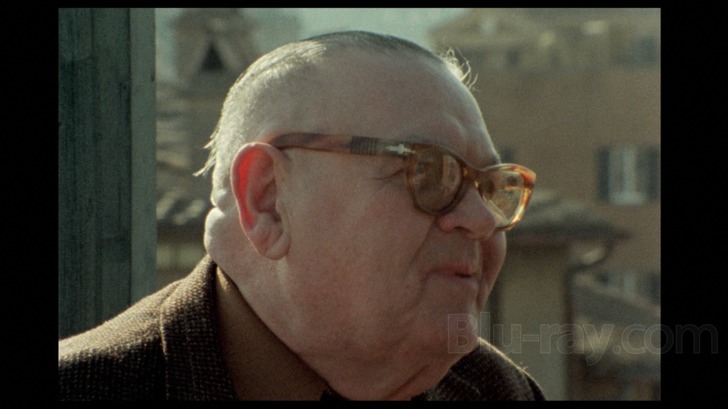
The Last of the Unjust is presented on Blu-ray courtesy of Cohen Media Group with an AVC encoded 1080p transfer in 1.85:1 (the contemporary framing sequences) and (mostly) 1.53:1 (for the archival Murmelstein interview footage). (Some other brief snippets like the Nazi propaganda film and some still images are in slightly different aspect ratios.) There's a marked difference between the newer footage and the old, as is to be expected, something furthered by the fact that the archival Murmelstein footage appears to be 16mm. That footage is therefore quite a bit grainier and rougher around the images, though everything is remarkably stable, damage free, and free of any noticeable fading. The newer footage is quite a bit sleeker, with a much finer grain field, but better saturated colors and a much clearer, sharper looking image. There are no signs of digital tweaking here, and the result, while offering source related variances, is very organic and natural looking.
The Last of the Unjust Blu-ray Movie, Audio Quality 
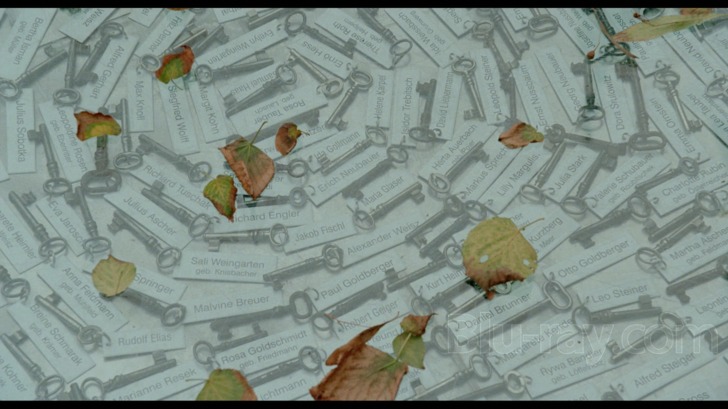
The Last of the Unjust features a DTS-HD Master Audio 5.1 mix, though be aware for some odd reason the two discs are authored to default to the also included Dolby Digital 5.1 option (note to Cohen: always default to lossless audio, or risk the rath of audiophiles everywhere). There's truly not a lot here that the surround mix can really provide, other than brief moments of immersion like the opening when a high speed train whisks by Lanzmann at the Theresienstadt train station, or, later in the film, ambient environmental effects when Lanzmann casts his camera on various abandoned buildings and fields in the area. The bulk of this piece is either Lanzmann narrating, Lanzmann reading, or (mostly) Lanzmann and Murmelstein talking to each other. All of that verbiage is presented very cleanly and clearly, as are other, more transitory, moments like a cantor singing part of the Kol Nidre service.
The Last of the Unjust Blu-ray Movie, Special Features and Extras 
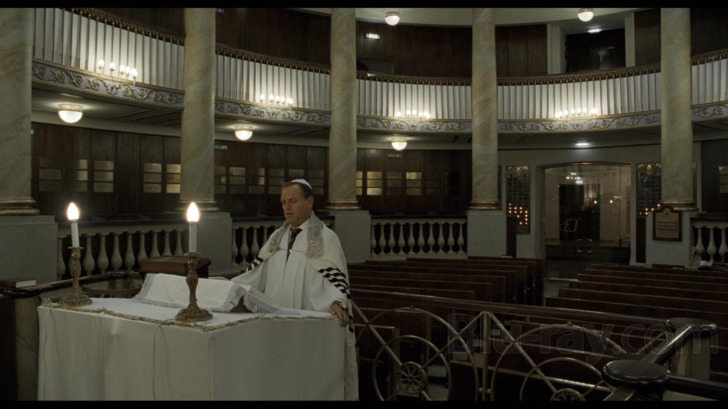
- Theatrical Trailer (1080p; 2:09)
- Interview with director Claude Lanzmann with Colin Keveney (1080p; 4:01) is a brief but interesting piece that finds Lanzmann offering a defense of Murmelstein and his place in Jewish history.
The Last of the Unjust Blu-ray Movie, Overall Score and Recommendation 
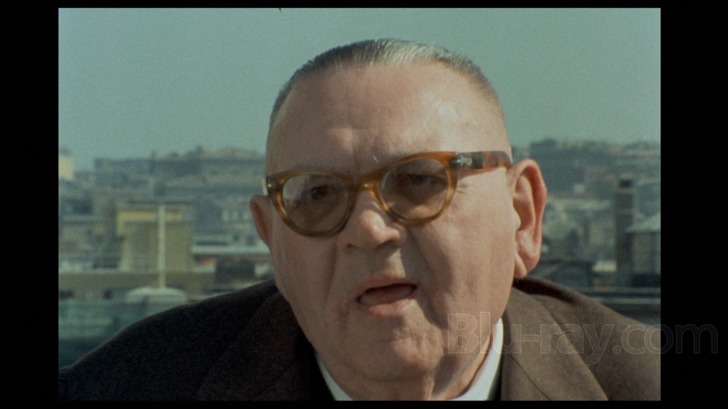
A Jewish friend of mine with a very arch and pitch black sense of humor once joked to me about Shoah, "The damned thing lasted longer than the actual Holocaust!" Lanzmann is certainly not one to redact much of his interviews, and so audiences need to be patient again with The Last of the Unjust, for it unfolds slowly if not always inexorably, given Murmelstein's flights of literary fancy, allusion and metaphor. This is another sad, triumphant, depressing, victorious amalgamation of a life tossed and turned by epochal winds. Anyone interested in the Shoah, or indeed Shoah, will find this a more than worthwhile piece. Highly recommended.
Similar titles
Similar titles you might also like

Shoah
1985

Faces Places
Visages villages
2017

Cameraperson
2016

The Look of Silence
2014

Out 1
Out 1, noli me tangere
1971

A Touch of Sin
天注定 / Tian zhu ding
2013

Stray Dogs
郊游 / Jiao you
2013

Grey Gardens
1975

The Story of Film: An Odyssey
2011

The Gleaners and I
Les glaneurs et la glaneuse
2000

Sympathy for the Devil
One Plus One / The Rolling Stones
1968

I, Daniel Blake
2016

Henri-Georges Clouzot's Inferno
L'Enfer d'Henri-Georges Clouzot
2009

Nanook of the North
1922

Sarah's Key
Elle s'appelait Sarah
2010

The Marriage of Maria Braun
Die Ehe der Maria Braun
1978

We Are X
2016

And Everything Is Going Fine
2010

General Idi Amin Dada: A Self-Portrait
Général Idi Amin Dada: Autoportrait
1974

Paris Is Burning
1990
